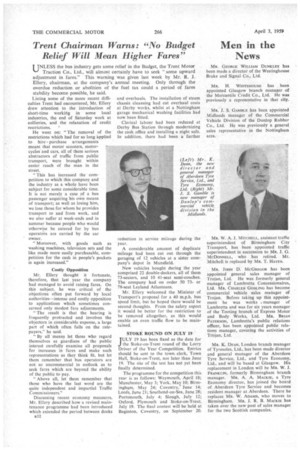Trent Chairman Warns: "No Budget Relief Will Mean Higher Fares , '
Page 40

If you've noticed an error in this article please click here to report it so we can fix it.
UNLESS the bus industry gets some relief in the Budget, the Trent Motor Traction Co., Ltd., will almost certainly have to seek "some upward
adjustment in fares." This warning was given last week by Mr. R. J. Ellery, chairman, at the company's annual meeting. Only through the overdue reduction or abolition of the fuel tax could a period of fares stability become possible, he said.
Listing some of the more recent difficulties Trent had encountered, Mr. Ellery drew attention to the introduction of short-time working in some local industries, the end of Saturday work at collieries, and the relaxation of credit
restrictions. .
He went on: "The removal of the restrictions which had for so long applied to hire purchase arrangements meant that motor scooters, motorcycles and cars, all of them serious abstractors of traffic from public transport, were brought within easier reach of the man in the street.
"This has increased the competition to which this company and the industry as a whole have been subject for some considerable time. It is not merely a case of a bus passenger acquiring his own means of transport; as well as losing him, we lose those for whom he provides transport to and from work, and we also suffer at week-ends and in summer because people who would otherwise be catered for by bus operators are carried by the car owner.
"Moreover, with goods such as washing machines, television sets and the like made more easily purchasable, competition for the cash in people's pockets is again increased."
Costly Opposition Mr. Ellery thought it fortunate, therefore, that last year the company had managed to avoid raising fares. On this subject, he was critical of the objections often put forward by local authorities—intense and costly opposition to applications which sometimes concerned only modest fare adjustments.
"The result is that the hearing is frequently protracted and involves the objectors in considerable expense, a large part of which often falls on the ratepayers," he said.
" By all means let those who regard themselves as guardians of the public interest carefully examine all proposals for increases in fares and make such representations as they think fit, but let them remember that bus operators are not so uncommercial in outlook as to seek fares which are beyond the ability of the public to pay.
"Above all, let them remember that those who have the last word are the quite independent and impartial Traffic Commissioners."
Discussing recent economy measures, Mr. Ellery described how a revised maintenance programme had been introduced which extended the period between docks 232 and overhauls. The installation of steam chassis cleansing had cut overhaul costs at Derby works, whilst at a Nottingham garage mechanical washing facilities had now been fitted.
Clerical labour had been reduced at Derby Bus Station through modernizing the cash office and installing a night safe. In addition, there had been a further reduction in service mileage during the year.
A considerable amount of duplicate mileage had been cut out through the garaging of 12 vehicles at a sister cornpany's depot in Mansfield.
New vehicles bought during the year comprised 22 double-deckers, all of them 73-seaters, and 10 41-seat semi-coaches. The company had on order 50 73or 78-seat Leyland Atlanteans.
Mr. Ellery welcomed the Minister of Transport's proposal for a 40 m.p.h. bus speed limit, but he hoped there would be second thoughts. From the safety aspect it would be better for the restriction to be removed altogether, as this would enable an even traffic flow to be maintained.
STOKE ROUND ON JULY 19 TULY 19 has been fixed as the date for J the Stoke-on-Trent round of the Lorry Driver of the Year Competition. Entries should be sent to the town clerk, Town Hall, Stoke-on-Trent, not later than June 19. The site of the test has not yet been finally determined.
The programme for the competition this year is as follows: Weymouth, April 18; Manchester, May 3; York, Ma/ 10; Birmingham, May 24; Coventry, June 14; Leeds, June 21; Southend-on-Sea, June 28; Portsmouth, July 4; Slough, July 12; Oxford, Plymouth and Stoke-on-Trent, July 19. The final contest will be held at Baginton, Coventry, on September 20.
































































































































